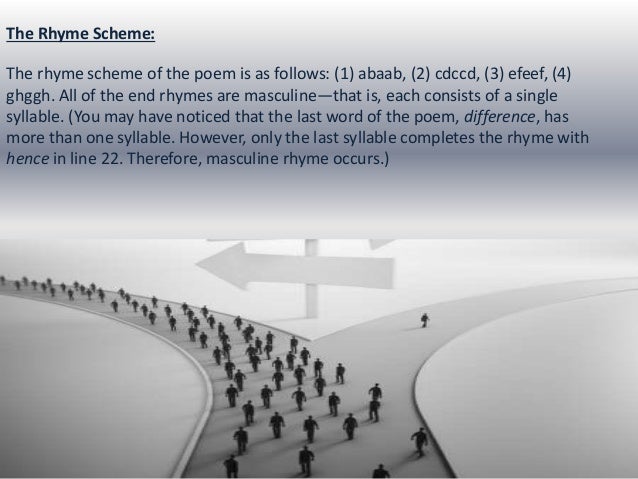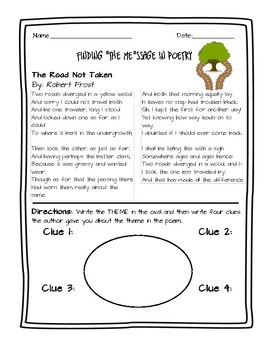Road Not Taken Theme
Day r survival premium pc download. At first we can not survive even the encounter with a rat, but when we raise the level we can fight many more threats.The movement by the map in Day R is very similar to the movement in the Fallout map, game with which shares many other similarities. Moving around the map, of course, will quickly exhaust all our reserves of fatigue, hunger and thirst.
Theme: The theme of the poem ‘The Road not Taken’ revolves around choices. It is about the decisions we make and the fact that we must live with them. The poem is often seen as an inspirational piece as it propagates the idea of choosing the unconventional and favoring the new and unexplored ways. The poem inspires us to face the challenging realities in life. The chief theme of his poetry is an ambiguous relationship with nature. He is interested in the paradox.
Two roads diverged in a yellow wood,
And sorry I could not travel both
And be one traveler, long I stood
And looked down one as far as I could
To where it bent in the undergrowth;
Then took the other, as just as fair,
And having perhaps the better claim,
Because it was grassy and wanted wear;
Though as for that the passing there
Had worn them really about the same,
And both that morning equally lay
In leaves, no step had trodden black.
Oh, I kept the first for another day!
Yet knowing how way leads on to way,
I doubted if I should ever come back.
I shall be telling this with a sigh
Somewhere ages and ages hence:
Two roads diverged in a wood, and I—
I took the one less traveled by,
And that has made all the difference.[1]
'The Road Not Taken' is a well-known poem by Robert Frost, published in 1916 as the first poem in the collection Mountain Interval. Its central theme is the divergence of paths, both literally and figuratively, although its interpretation is noted for being complex and (like the road fork itself) potentially divergent.
History[edit]
Frost spent the years 1912 to 1915 in England, where among his acquaintances was the writer Edward Thomas. Thomas and Frost became close friends and took many walks together. After Frost returned to New Hampshire in 1915, he sent Thomas an advance copy of 'The Road Not Taken'. Thomas took the poem seriously and personally, and it may have been significant in Thomas' decision to enlist in World War I. Thomas was killed two years later in the Battle of Arras.[2]
Analysis[edit]
'The Road Not Taken' is a narrative poem. It reads naturally or conversationally and begins as a kind of photographic depiction of a quiet moment in woods. It consists of four stanzas of 5 lines each. The first line rhymes with the third and fourth, and the second line rhymes with the fifth (ABAAB). The meter is basically iambic tetrameter, with each line having four two-syllable feet. Though in almost every line, in different positions, an iamb is replaced with an anapest. The variation of the rhythm gives naturalness, a feeling of thought occurring spontaneously, and it also affects the reader's sense of expectation.[3] In the only line that contains strictly iambs, the more regular rhythm supports the idea of a turning towards an acceptance of a kind of reality: 'Though as for that the passing there … ' In the final line, the way the rhyme and rhythm work together is significantly different, and catches the reader off guard.[4]
It is one of Frost's most popular works. Some have said that it is one of his most misunderstood poems, claiming that it is not simply a poem that champions the idea of 'following your own path', but that the poem, they suggest, expresses some irony regarding that idea.[5][1]
Frost's biographer Lawrance Thompson suggests that the poem's narrator is 'one who habitually wastes energy in regretting any choice made: belatedly but wistfully he sighs over the attractive alternative rejected'.[6] Thompson also says that when introducing the poem in readings, Frost would say that the speaker was based on his friend Edward Thomas. In Frost's words, Thomas was 'a person who, whichever road he went, would be sorry he didn't go the other. He was hard on himself that way.'[7]
Regarding the 'sigh' that is mentioned in the last stanza, it may be seen as an expression of regret or of satisfaction, but there is significance in the difference between what the speaker has just said of the two roads, and what he will say in the future.[8] According to the biographer Lawrance Thompson, as Frost was once about to read the poem, he commented to his audience, 'You have to be careful of that one; it's a tricky poem—very tricky,' perhaps intending to suggest the poem's ironic possibilities.[6][9] A New York Times Sunday book review on Brian Hall's 2008 biography Fall of Frost states: 'Whichever way they go, they're sure to miss something good on the other path.'[10]
David Orr in the Paris Review argued the poem was widely misinterpreted.[11]
References[edit]
- ^ abRobinson, Katherine. 'Robert Frost: 'The Road Not Taken''. Poetry Foundation. Poetry Foundation. Retrieved 9 August 2016.
- ^Hollis, Matthew (2011-07-29). 'Edward Thomas, Robert Frost and the road to war'. The Guardian. London. Retrieved 8 August 2011.
- ^White, James Boyd (2009). Living Speech: Resisting the Empire of Force. Princeton University Press. ISBN9781400827534. p. 98
- ^Timmerman, John H. (2002). Robert Frost: The Ethics of Ambiguity. Bucknell University Press. ISBN9780838755327. p. 71
- ^Sternbenz, Christina. 'Everyone Totally Misinterprets Robert Frost's Most Famous Poem'. Business Insider. Business Insider. Retrieved 13 June 2015.
- ^ abThompson, Lawrance (1959). Robert Frost. Minnesota: University of Minnesota Press.
- ^Thompson, Lawrance Roger; Winnick, R. H. (1970). Robert Frost: The early years, 1874-1915. Holt, Rinehart and Winston. p. 546.
- ^Finger, Larry L. (November 1978). 'Frost's 'The Road Not Taken': A 1925 Letter Come to Light'. American Literature. 50 (3): 478–479. doi:10.2307/2925142. JSTOR2925142.
- ^Kearns, Katherine (2009). Cambridge Studies in American Literature and Culture. 77. Cambridge University Press. ISBN9780521109987. p. 73
- ^Miles, Jonathan (May 11, 2008). 'All the Difference'. New York Times. Retrieved June 13, 2015.
- ^Orr, David (2015-09-11). 'The Most Misread Poem in America'. The Paris Review. Retrieved 2020-04-12.
External links[edit]
| Wikisource has original text related to this article: |
| Wikiquote has quotations related to: Robert Frost |

- 'The Most Misread Poem in America' by David Orr, The Paris Review, September 11, 2015
